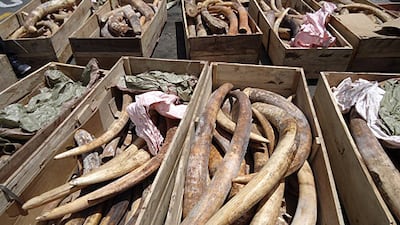DUBAI // Hundreds of pieces of raw elephant ivory have been seized in a shipment at Jebel Ali Port in Dubai, the Ministry of Environment and Water announced.
The haul, amounting to 259 pieces of ivory, was disguised as furniture being transported from an unspecified African country.
The ministry confiscated the shipment of ivory after it was stopped by Dubai Customs.
"The ivory was smuggled as furniture pieces," said Sultan Alwan, the ministry's assistant undersecretary for the external inspection sector. "Inspection by the ministry's technical staff at the port revealed that it contained 259 pieces of crude ivory tusks taken from Loxodonta africana elephants."
Also known as African bush elephants, their products are banned for trade by the Convention on International Trade in Endangered Species of Wild Fauna and Flora (Cites). The UAE became a signatory to Cites in 1990, represented by the Ministry of Environment and Water.
The seizure comes after a campaign was launched by the airport security department of Dubai Police and the International Fund for Animal Welfare (Ifaw) to battle the illegal trade in ivory last week.
Videos warning passengers that ivory smuggling leads to prosecution have started being shown at Dubai International Airport.
The trade is said to be the cause of death of tens of thousands of elephants every year. The ministry said it noticed that hunting for ivory had led to a significant drop in the elephant population.
And the UAE's geographical location makes it susceptible as a hub for the illegal trade. "The UAE is situated on the route of ivory between Africa and the Far East," said Dr Elsayed Ahmed Mohamed, the regional director at Ifaw in Dubai. "Dubai is an excellent connection for airlines, sea ships and transportation, so we always assume that part of the transportation of ivory between Africa and Asia may pass through the UAE or Dubai."
And although efforts are being made to eradicate the practice, experts say more needs to be done. "Because this is the situation, the authorities have already made lots of efforts to combat the illegal trade of ivory," said Dr Mohamed. "For example, the Ministry of Environment and Water trained the customs. This isn't the first case of seizing shipments of ivory, I think it may be the fourth."
He said that because Dubai was a "good connection, anything may pass through but the police is doing good work."
He said countries of origin and destination should also persevere with their crackdowns on the trade.
"The UAE made a lot of good work as a transit point and I think more efforts should be made in the destination countries in the Far East to decrease the demand of ivory," he said. "More efforts need to be done in the originating country too, to combat the butchering for ivory."
Last November, Dubai Customs seized a haul worth Dh15 million at Jebel Ali Port. The 215 tusks, hidden in 40 boxes of beans, came from 108 African elephants .
Ifaw estimates that up to 50,000 elephants are killed each year to meet the increasing demand for ivory.
In March last year, 1.5 tonnes was intercepted in Sri Lanka on its way to Dubai. The shipment was from Kenya, with ivory hidden in containers marked as plastic waste.
Later that June, Cites reported that elephant-poaching levels had reached the worst in a decade.
cmalek@thenational.ae

Hundreds of pieces of raw elephant ivory seized in Dubai
Almost 260 pieces of raw elephant ivory have been seized in a shipment at Jebel Ali Port in Dubai, the Ministry of Environment and Water has said.
Most popular today
